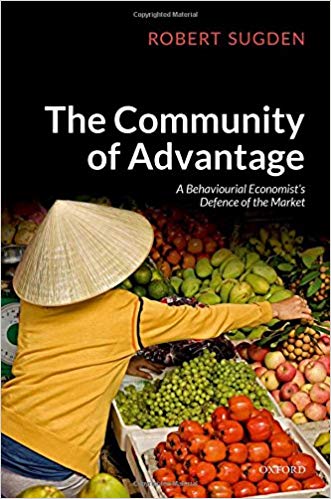Richard Godden: “The Community of Advantage” by Robert Sugden

Neoclassical normative economics seeks to avoid state paternalism. On the assumption that human beings display “integrated preferences” (i.e. preferences that are stable, context-independent and internally consistent), this objective may be secured by public policy objectives being based on “preference-satisfaction”. However, psychological experiments over the past 30 years have demonstrated that the assumption is false: human preferences are highly context-dependent (e.g. people display loss aversion and thus value an item more when they possess it than when they do not). This finding challenges neoclassical economics and raises the question whether there is no alternative to centre-left paternalism.
Professor Robert Sugden of the University of East Anglia thinks that there is an alternative and in The Community of Advantage makes “an attempt to maintain the liberal tradition against … a challenge from behavioural economics” (page 4).
Sugden dismisses previous efforts to meet that challenge. In particular, he takes on those who argue that, whilst human decisions may be influenced by irrational factors, people have “latent preferences” which may be used as a plumb line for preference-satisfaction. He asserts that there is no experimental basis for believing that such preferences exist and thus they cannot form the foundation of welfare planning. He thus dismisses Sunstein and Thaler’s concept of welfare planners creating conditions in which people are “nudged” towards decisions that satisfy their latent preferences. In short, Sugden shares Hume’s scepticism about human rationality and believes that economics should proceed on the basis that such rationality does not exist.
Some might conclude that this leaves liberal economics nowhere to go. However, Sugden suggests that it can be saved by the substitution of what he calls the “Individual Opportunity Criterion” for the traditional preference-satisfaction criterion. He argues that, “as viewed by each citizen separately, more opportunity for that person is better than less” (page xi) and hence he attaches “normative significance to opportunity sets without explicit reference to individuals’ preferences” (page 115). He defends this approach on the basis that it treats humans as responsible agents and the concept of responsibility “provides philosophical underpinning for the claim that opportunity has value” (page 106).
Sugden sets this proposal in the context of “a contractarian perspective”. He points out that, whether expressly or impliedly, economists normally address “an impartially benevolent autocrat” (page 23) and argues that it is both more useful and more consistent with a liberal view of society, to adopt the point of view of individual participants in society: “the most fundamental characteristic of this perspective is that a recommendation is addressed to a set of individuals, showing those individuals how they can coordinate their behaviour to achieve mutual benefit” (page 37).
This is, of course, a liberal, market-based view and Sugden, therefore, examines and defends the moral status of market relationships. He recognises that the findings of behavioural experiments challenge the idea that the achievement of mutual benefit is generally well served by the free actions of self-interested agents in competitive markets. Such experiments have found situations in which self-interested agents would fail to realise opportunities for mutual benefit but ordinary human beings succeed in doing so. Sugden, however, argues that it is wrong to think that there is “a fundamental opposition between the attitudes that are expressed in market relationships and those that are expressed in genuinely social relationships” (page 207). His conclusion is that “it may be possible to think of market relationships as expressing cooperative attitudes that are complementary with kinds of pro-sociality that can help individuals to solve collective action problems” (page 208).
Underlying these ideas is a long history of philosophical thought. The “contractarian” viewpoint is expressly derived from the thinking of Hobbes and Hume and a nuanced view of human behaviour in a market context can be traced back to Adam Smith (see Humanomics by Vernon Smith and Bart Wilson, which is reviewed on this website). More fundamentally, as Sugden acknowledges, he is greatly indebted to John Stuart Mill’s concept of the market as a “community of advantage”, hence the title of his book.
Sugden’s approach is thus vulnerable to some of the charges levelled against his philosophical forebears. In particular, many will question the moral relativism inherent in it and point out that, despite his best efforts to eliminate absolute moral values, the statement that “the ultimate authority for judging what is in a person’s interests is that person himself” (page 83), which underlies the Individual Opportunity Criterion, appears to be an assertion of an absolute reference point.
The psychological foundations of Sugden’s approach are of more recent origin than its philosophical foundations and some caution is required in relation to them. The results of “trust games” and similar experiments are not in doubt but the interpretation of at least some of their findings is controversial, as Sugden himself acknowledges. Consequently, whilst his case for the consistency of his theory with human psychology is persuasive, it is not conclusive. In particular, whilst it is clear that people often do not display “integrated preferences”, it is not clear that the concept of rational preferences must be completely discarded. Sugden asserts that he does “not want to claim that individuals are never conscious of akrasia” (i.e. acting against their better judgement; page 81) and, once this concession has been made, one has to take seriously the possibility that individuals have some latent preferences (their “better selves”) even if this concept cannot bear the weight that has sometimes been placed on it by economists.
Many readers will thus take issue with much of what Sugden says. However, those who dislike his moral relativism may still accept that a “contractarian” viewpoint is useful and those who disagree with his view of human psychology should still take note of the fact that he is suggesting that a liberal approach to economics is justified even if one adopts this. Furthermore, the philosophy inherent in his defence of the market economy should not distract from the fact that his underlying position is one that can be endorsed by a wide spectrum of people. The final few lines of the book are worth quoting in full:
“I share Mills’ conviction that cooperation for mutual benefit is the fundamental organising principle of a well-ordered society. The market is not, or should not be, an arena of non-moral, instrumental motivation from which practices that are more genuinely or more intrinsically valuable need to be insulated. Market transactions are a crucial part of the network of cooperative relations that make up civil society” (page 281).
The Community of Advantage is not an easy read. Indeed, Chapter 6 (The Invisible Hand) is such heavy going that some readers may be tempted to give up at that point. However, the reader who leaves out some parts of the book will still benefit from other parts and the fact that large parts are stitched together sections of previously published papers is helpful since key concepts are considered on a number of occasions.
Those who persevere with the book will be rewarded. Whatever one’s philosophical starting point, it is worth reading.
“The Community of Advantage” by Robert Sugden was published in 2018 by Oxford University Press (ISBN 978-0-19-882514-2). 281 pp, plus notes.
Richard Godden is a Lawyer and has been a Partner with Linklaters for over 25 years during which time he has advised on a wide range of transactions and issues in various parts of the world.
Richard’s experience includes his time as Secretary at the UK Takeover Panel and a secondment to Linklaters’ Hong Kong office. He also served as Global Head of Client Sectors, responsible for Linklaters’ industry sector groups, and was a member of the Global Executive Committee.

